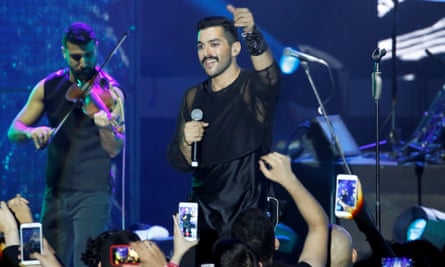Members of the lesbian, gay, bisexual and transgender (LGBT) community in Egypt are living in fear following a wave of arrests and violence.
Rights groups say dozens of people have been detained in the crackdown, which began after rainbow flags were waved at a rock concert on the outskirts of Cairo last month, prompting a furious reaction in the Egyptian media.
The current spike in arrests is part of an ongoing climate of repression against the LGBT community in Egypt. LGBT people have long grappled with government repression, including online surveillance, entrapment and abuse in detention.
Homosexuality is not illegal under Egyptian law, but homosexual acts in public are illegal, and members of the LGBT community are often arrested on euphemistic charges, such as “debauchery”.
“It’s truly messed up that the government leaves all the thuggery in the streets, poverty everywhere – and is concerned with what people are doing in their bedrooms,” said Abdel-Rahman, whose name has been changed for his safety. He is now avoiding meeting potential partners in public for fear of being tracked by authorities.
The wave of arrests has so far swept up 57 people, according to a Cairo-based rights group, the Egyptian Initiative for Personal Rights.
It appears to have been triggered by a performance by the Lebanese band Mashrou’ Leila on 22 September, where several concertgoers raised rainbow flags in support of the group’s lead singer, Hamed Sinno, one of the very few openly gay performers in the Middle East. The concert was poignant for a group that was twice banned from playing in Jordan because of Sinno’s sexuality. The band initially called the Cairo concert “one of the best shows we’ve ever played”.

Their joy has since faded, however. “The [Egyptian] state apparatus is hellbent on executing the most atrocious of human rights violations,” the group later said in a statement in reaction to the crackdown.
Egypt’s media, which is dominated by conservative, pro-government channels, reacted with fury to photos circulating online of the rainbow flags waving above the crowd. “Homosexuality is a crime that’s as terrible as terrorism,” proclaimed a prime-time TV host, Ahmed Moussa.
Mohsen al-Balasy, a poet, was ejected from the set of al-Mehwar TV after being one of the few to publicly defend LGBT people. “I’m terrified of this society that’s excommunicating anyone who is different,” he said on air. The response was a barrage of calls from viewers attacking Balasy. One argued that gay people should be killed. Another demanded that the minister for health “examine” Balasy, adding: “All those kids should be rounded up now.”
The furore has sent a chill through LGBT communities. Sara, a lesbian, said that while the crackdown had so far largely targeted gay men, the increased attention on the LGBT community meant “our day is coming”. She said many in the community had shut down their social media accounts fearing they could be used by the authorities to target them. “I feel I have been surveilled for years, like those around me, and when the opportunity is right, they will pick us up,” said Sara, whose name has also been changed. “The question so many of us ask: is now that time?”
In the days after the concert, seven people were arrested accused of “promoting sexual deviancy”, for raising the rainbow flag. One man was immediately given a six-year prison sentence. Six were forced to undergo anal examinations, according to Amnesty International.
Egyptian authorities then raided cafes and homes, rounding up scores of LGBT people, who are often singled out for physical abuse while incarcerated. Members of the LGBT community were especially fearful of the involvement of national security prosecutors, normally tasked with investigating terrorism cases.
“To be known as a homosexual in a police facility is a horrible thing,” said Abdel-Rahman, who was arrested in 2014. “Gay people are sexually harassed and abused in police stations when they are arrested, and the prisoners share in the abuse. Sometimes the officers incite the prisoners.”
“People are terrified,” said Scott Long, a researcher previously based in Cairo who tracks rights violations against Egypt’s LGBT community. Long said this latest wave of arrests was part of a long campaign that began after Abdel Fatah al-Sisi came to power in 2013, estimating that more than 300 people had been arrested – and nearly all convicted – since.
“That’s more than we knew of during the Mubarak-era campaign,” he said, referring to Sisi’s predecessor, Hosni Mubarak, under whose rule the arrest of 52 men in a gay nightclub in 2001 had previously been the largest crackdown on the LGBT community.
Egypt’s Supreme Council for Media Regulation later issued a statement banning any discussion of LGBT issues in the media, apart from where the person “shows repentance”, and referred to homosexuality as “a shameful disease”.
The country’s parliament is now debating criminalising homosexuality, with a punishment of up to 15 years in prison. The Coptic church is also organising a conference entitled the Volcano of Homosexuality on how to “cure” gay people.
“The government wants to win the support of conservative sections of society, to say that Sisi isn’t allowing homosexuals to run free,” said Abdel-Rahman, adding that the government was benefiting from the uproar about LGBT rights in order to distract the public from social and economic problems.
Additional reporting by Adham Youssef
